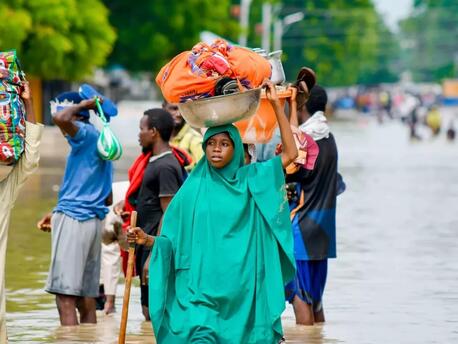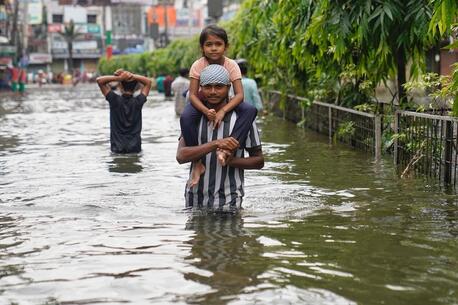
UNICEF Providing Emergency Aid After Devastating Floods in Bangladesh
A catastrophic series of flash floods that began in May 2022, with a second wave starting in mid-June, have left an estimated 7.2 million people reeling in northeastern Bangladesh. UNICEF is part of a large-scale humanitarian response across the region, protecting children and delivering emergency water and health supplies.

Since the start of the flooding, more than 472,000 people have been evacuated to 1,605 safety shelters. As of July 4, over 73,000 were still living in around 700 shelter centers in Sunamganj, Sylhet and Moulvibazar districts. Girls and women in the overcrowded shelters are at high risk of gender-based violence.

In Sylhet, Akil and his sisters Fariha and Samia, above, lived in the back of their father's truck for days after furious floodwaters swept away their home and all of their belongings. They tried to take shelter at a neighboring school, but it was filled beyond capacity. The family survived for two days without food or water.

Kazi Dil Afroza Islam, Chief of Field Office at UNICEF Bangladesh, above right, teaches flood-affected families cut off from safe drinking water how to use water purification tablets or aquatabs in Sylhet, Bangladesh on June 21. Lack of access to safe drinking water remains a major concern: the Department of Public Health Engineering reports that 106,727 water points were destroyed by the flooding.
Drinking contaminated water can cause acute watery diarrhea, a major killer of young children, and other waterborne diseases. As of July 5, 8,831 cases of waterborne diseases had been reported in Sylhet division, along with 57 deaths.

UNICEF is supplying communities with water purification tablets, hygiene kits and jerry cans, above, and repairing damaged tube wells. With the support of UNICEF and partners, 846,600 people have been reached with WASH interventions since the beginning of the flood.

UNICEF is immunizing children in flood shelters, providing communities with awareness messaging on drowning prevention and physical and mental health issues, and distributing dignity kits to adolescent girls and women. Above, UNICEF staff unload emergency supplies for flood-affected families in Sylhet on June 22.

Above, a boy tries to dry his soaked schoolbooks on a patch of high ground in Sylhet on June 21. His family's whole house was flooded, and he salvaged what little he could. More than 80 percent of primary and secondary schools in Sylhet and Sumanganj districts were inundated by the floodwaters, affecting nearly 673,000 children.
UNICEF is offering early childhood and psychosocial activities and supporting efforts to help students resume their education, but for now many of the schools that were not flooded are being used as emergency shelters.

Floodwaters poured into the tin house where Rukhsana Akhtar Kajol, 28, and her 4-year-old daughter, Nusrat, above, live in Sylhet. With Nusrat's father, a day laborer, out of work, the family is struggling to survive on dry food and water delivered by boat from a neighboring village. "I'm frightened by the thunder and water," said Nusrat." I cannot play because there is water everywhere. I miss my playground."
UNICEF is working with partners to provide urgent lifesaving assistance to families struggling to survive the latest climate-related crisis. Your donation can help vulnerable children. Please donate.
Top photo: A family travels by boat after flash floods inundated northeastern Bangladesh in May and June 2022. Photos by Sultan Mahmud Mukut for UNICEF.
HOW TO HELP
There are many ways to make a difference
War, famine, poverty, natural disasters — threats to the world's children keep coming. But UNICEF won't stop working to keep children healthy and safe.
UNICEF works in over 190 countries and territories — more places than any other children's organization. UNICEF has the world's largest humanitarian warehouse and, when disaster strikes, can get supplies almost anywhere within 72 hours. Constantly innovating, always advocating for a better world for children, UNICEF works to ensure that every child can grow up healthy, educated, protected and respected.
Would you like to help give all children the opportunity to reach their full potential? There are many ways to get involved.




